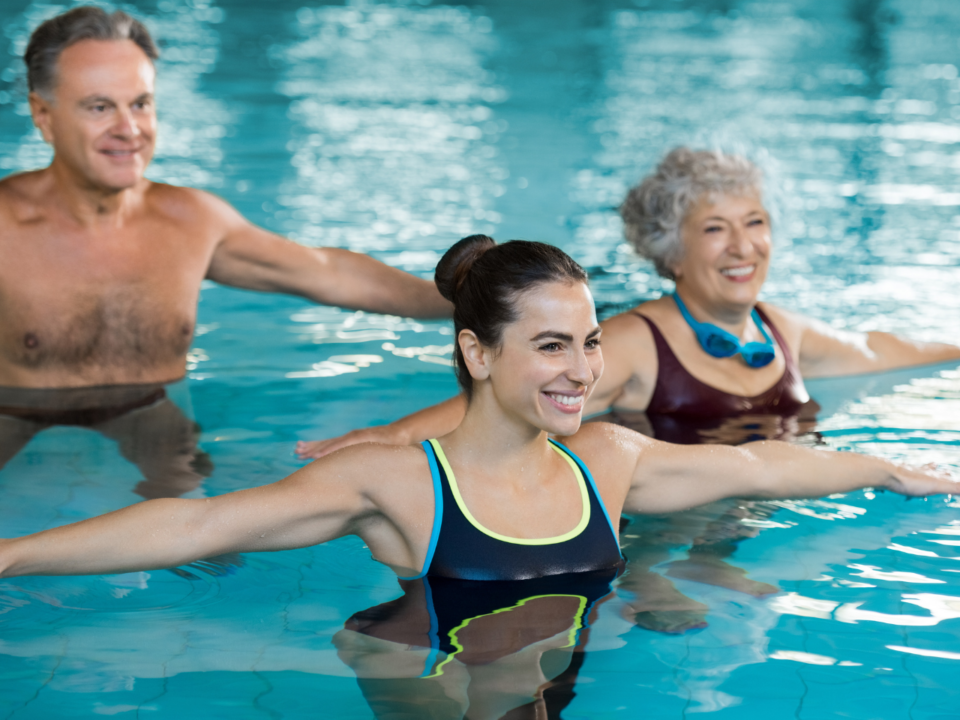
The Benefits of Swimming
As we enter the summer months, one thing is abundantly clear: everyone wants to be in the pool. It’s fun to cool off, splash around, and enjoy the sunshine (or air conditioning in an indoor pool). So, how do you get started, and what can swimming do for you?
Stacey Adams is Baton Rouge’s District Aquatics Director at the Americana, A.C. Lewis, and Exxon Mobile YMCAs. Using her 6 years of experience, she weighed in on how swimming at any age can benefit you and what accommodations are available.
Where to Go
Your local aquatic center is a great place to start, and for many people that includes your local YMCA. Aquatic centers provide a variety of different swimming-adjacent programs for everyone from children to adults. These programs include open swim hours where anyone can dip into the pool, structured classes like water aerobics or synchronized swimming, and more health-based choices like hydrotherapy. If you don’t know how to swim, group-based and private adult swimming lessons have become very popular in recent years, so you’re in good hands!
Put Swimming Anxiety to Rest
It’s important to understand that there is nothing to be afraid of or nervous about when it comes to swimming, learning to swim, or going to the aquatics center for the first time. Adams notes that for adults, getting started can be difficult due to anxiety about trying something new.
“Once they sign up, they need to know that the lesson will be at their pace and to try not to let fear and anxiety stop them from following through,” shares Adams. “Sometimes coming a day early to meet the instructor and see the pool can help if someone has anxiety. All the instructors are trained, and there is always a lifeguard on duty. Other than an open mind, just bring a swimsuit and towel.”
What to Bring
Once you have decided where to go and what you would like to do, it’s time to pack the essentials. A backpack, tote, or drawstring bag will work perfectly. Some must-pack items include a towel or bathrobe, flip-flops or water shoes for the shower, an extra change of clothes, and a plastic bag for your swimsuit and towel. Goggles and a swim cap may also be good to pack.
Hygiene essentials to include, especially if you plan to use the facility’s showers afterward, are travel-size bottles of shampoo, conditioner, body wash, an extra towel, and possibly a wash rag or loofah. Deodorant, moisturizer, and lotion can also help you feel a bit fresher after exercising in the pool.
Lastly, a snack and water are very important to pack in your bag. Despite being in the water, exercising in the pool will still dehydrate you, so having a water bottle or two on hand is a must. Packing a lunch or a snack to have afterward will keep you energized and act as a delicious reward as well.
The Benefits
Having a good, long swim offers plenty of benefits to your health and happiness. According to Adams, swimming allows your heart to become stronger and your lungs to be more efficient in utilizing oxygen, which lowers the risk of heart disease and stroke. Having a regular swimming routine can also reduce stress, lower anxiety and depression, and both regulate and enhance your quality of sleep.
“Aquatic therapy has been shown to help with joint pain and stiffness as well as improved muscle strength in people with osteoarthritis, fibromyalgia, joint pain, or other severe pain,” explains Adams. “Due to the nature of water, these water workouts are low impact while the buoyancy of the water adds resistance to make workouts challenging. Many people that do these workouts 2-3 times a week say that it is the best part of their week and it helps them feel better and sleep better.”
Since many swim lessons are held in group settings, it’s also a great way to make new friends. Like having someone to work out with, having people to chat with during lessons will help you hold yourself accountable to going while also improving your mental health through the bonds of friendship.
Safety Accommodations
For people who have mobility issues, it can be daunting to try to find a good and safe way to exercise. Luckily, many aquatic facilities have equipment and policies in place to make the pool as inclusive as possible.
The first safety accommodation to look for is a pool with lifeguards on duty. No matter how strong of a swimmer you are, emergencies do happen. If there are no lifeguards available, having a friend go with you ensures someone will be available just in case to help and you’ll have someone to swim with.
The second most important accommodation is one that ensures you are able to get into the pool. For people who have mobility issues, walk with a cane, or are wheelchair-bound, having a clear way to enter the pool will help you feel comfortable and confident about swimming.
Many facilities, including the YMCA, have many different types of pools that fulfill various needs. Some will have ramps that allow you to enter the pool easily while others will have stairs and handrails. Some pools have a chair installed that will lower you into the pool for easy access.
Adams says that there are float belts available that allow people to stay afloat and move their legs freely to get exercise in ways that land doesn’t allow them to. She explains that through water’s buoyancy, people who are in a wheelchair or often in a sitting position will find relief in deep water as they are able to stand up and straighten out their spine.
Remember, Swimming is for Everyone
Ultimately, swimming is a social activity that brings people of all ages, backgrounds, and personalities together. Nothing is more human than enjoying an activity together, no matter if it’s with friends, family, or future friends-to-be.
“Everyone no matter their age, ability level, or experience with swimming can benefit in many ways from swim lessons and water therapy. Please make sure that you never swim alone; YMCAs have pools with open lanes and group water exercises that are always guarded by a trained lifeguard,” says Adams. “If swim lessons are on your bucket list, join the growing number of adults learning to swim. Call your local YMCA or swim program and sign up today.”

